AP
The politics of immigration play differently along the US-Mexico border
Published
8 months agoon
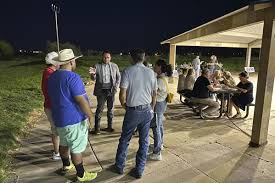
By MORGAN LEEUpdated 10:06 AM GMT+6, September 20, 2024Share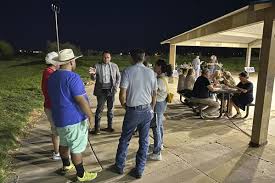
SUNLAND PARK, N.M. (AP) — The politics of immigration look different from the back patio of Ardovino’s Desert Crossing restaurant.
That’s where Robert Ardovino sees a Border Patrol horse trailer rumbling across his property on a sweltering summer morning. It’s where a surveillance helicopter traces a line in the sky, and a nearby Border Patrol agent paces a desert gully littered with castoff water bottles and clothing.
It’s also where a steady stream of weary people, often escorted by smugglers, scale a border wall or the slopes of Mount Cristo Rey and step into an uncertain future. It’s a stretch of desert where reports of people dying of exhaustion and exposure have become commonplace.
“It’s very obvious to me, being on the border, that it’s not an open border. It is a very, very, very difficult situation,” said Ardovino, who pays for private fencing topped by concertina wire to route migrants around a restaurant and vintage aluminum trailers that he rents to overnight guests.
“I wish the facts would rule this conversation, and being here, I know they do not.”
As immigration politics have moved to the forefront of this year’s presidential election, they’ve dominated contests across the country for congressional seats that could determine which party controls Congress. But the urgency of the situation is greater in some districts than others.
Three of 11 congressional district races along the southern U.S. border are hotly-contested rematches in districts that flipped in 2022 with the election of Democratic Rep. Gabe Vasquez in New Mexico and Republican Reps. Juan Ciscomani in Arizona and Monica De La Cruz in Texas.
A partner in a decades-old family business, Ardovino lives in one border district in Texas and works in Vasquez’s district in New Mexico. He was disappointed by the collapse in February of a bipartisan border bill in Washington, and he bristles at politicians talking from afar about an “open border.”
What he wants, more than anything, is a collective fix — one that doesn’t diminish the work of border agents or gloss over real-world challenges like migrants fleeing dictators.
“It’s frustrating for people who need a border bill of any kind, any time, to start dealing with the big picture,” Ardovino said. “I’d rather be running a restaurant than working on these fences.”
Democrats touting border solutions
Early voting starts Oct. 8 in Sunland Park, on the edge of a whiplashed congressional district that flipped in 2018, 2020 and again in 2022 with the election of Vasquez.
Democrats in Congress are promoting border enforcement as seldom before, including a half-dozen bills from Vasquez. He touts his knowledge of the region as the U.S.-born son of immigrants with relatives on both sides of the border.
“With migrant activity along the border, we have had to adjust our approach,” said Vasquez. “I can say here that the sky is blue for 50 years, but when it turns red, you have to admit that it’s turning red.”
Here, border politics are literally matters of life and death. Federal and local authorities describe a new humanitarian crisis along New Mexico’s nearly 180-mile portion of the border, where migrant deaths from heat exposure have surged and merciless smuggling cartels inflict havoc.
Where Doña Ana County shares a 45-mile stretch of border with Mexico, the sheriff’s department reported 78 lifeless migrant bodies found between January and mid-August.
“The death toll, in my 21 years of working with the Doña Ana sheriff’s department, we have not had this,” said Major Jon Day.
In the Texas race, Democratic challenger Michelle Vallejo has taken a hard line on border enforcement, shocking progressive allies in her campaign to unseat De La Cruz. A recent ad from Vallejo describes “chaos at the border” and urges bipartisan cooperation to deploy more Border Patrol agents and fight human trafficking cartels.
‘A responsibility to enforce the law’
In Arizona’s 6th Congressional District, Republican incumbent Ciscomani calls border enforcement his No. 1 priority. But he has distanced himself from former President Donald Trump’s sometimes caustic anti-immigrant rhetoric and avoided presidential campaign events in swing-state Arizona. Instead, Ciscomani tells an immigrant’s story — about his own arrival in the U.S. at age 11 from Hermosillo, Mexico. He received citizenship in 2006 and says he is determined to fix the border.
“We have a responsibility to enforce the law on the border, and we also are a community of immigrants — myself included — that came here to this country, and we’re seeking opportunity.”
Experts say voters near the border have tangible concerns about smugglers and contraband but know the benefits of authorized cross-border commerce and commuting.
“There is, I think, more of a nuanced view,” said Samara Klar, a pollster and professor at the University of Arizona School of Government and Public Policy.
Border patrol arrests on the southwest border plunged to a 46-month low in July after Mexican authorities stepped up enforcement and President Joe Biden temporarily suspended asylum processing. But in New Mexico, where the decline has been less pronounced, surging migrant deaths prompted coordinated U.S. law enforcement raids in August on stash houses where smugglers hide migrants.
Vasquez, looking to be the first Democrat to win reelection in New Mexico’s 2nd Congressional District since 1978, has pitched legislation to improve detection of fentanyl coming across the border and to disrupt cartel recruitment of young Americans to ferry migrants to hiding places — quick trips that offer $1,100 — amid a scourge of addiction and proliferation of homeless encampments in cities along the Upper Rio Grande.
But he also has plans to improve conditions at migrant detention centers and offer permanent residency to immigrants who fill critical jobs in the U.S.
Republicans walk a tightrope
Vasquez ousted one-term Republican Congresswoman Yvette Herrell by only 1,350 votes in 2022 after Democrats redrew congressional maps to split a conservative oil-producing region into three districts.
Herrell, seeking the seat for the fourth consecutive time, has described an “absolute chaotic scene” at the border, and joined Republican House leaders in claiming that Democrats undermined U.S. elections by opposing a proof-of-citizenship requirement for new voters.
“It’s one or the other,” Herrell said at a rally in Las Cruces with Republican House Speaker Mike Johnson. “It’s our sovereignty over the open border.”
Noncitizens already are prohibited from voting in federal elections under penalties including prison or deportation, and Vasquez says the new requirement would make participation more difficult for legitimate voters, including Native Americans who couldn’t vote in New Mexico until 1948. Data from states indicate that voting by noncitizens happens — though not in high numbers.
Herrell’s rhetoric on immigration takes aim at voters in a district Trump lost by a roughly 6% margin in 2020.
“It’s a tightrope that she’s got to walk in trying to get any of the pro-Trump enthusiasm,” said Gabriel Sanchez, director of the University of New Mexico Center for Social Policy.
The district’s voting age population is 56% Hispanic — with centuries-old ties to Mexican and Spanish settlement and a smaller share of foreign-born residents than the national average.
“Republicans have been focused more and more on the Hispanic vote because they sense that they can make some inroads,” Albuquerque-based pollster Brian Sanderoff said. “And in fact the Hispanic vote in southeastern New Mexico is split. If you’re a Hispanic right now in Lea County (in New Mexico), you’re almost as likely to be voting Republican as Democrat.”
Recently retired Border Patrol agent Cesar Ramos of Alamogordo says he felt stymied by limitations on prosecuting undocumented immigrants, whose arrival he says contributes to higher prices for housing and essentials. He applauds Herrell’s tough talk.
“People here in Alamogordo are 110% behind legal immigration, but despise that there are criminal acts of smuggling, and just breaking into the U.S. with no legal documentation,” said Ramos, a registered Republican of Puerto Rican heritage.
In Sunland Park, a working-class community nestled between the border and a quarterhorse racetrack, Democratic Party orthodoxy is being tested, too.
Sunland Park native Luis Soto said migrants who cross the border impact his own efforts to open a cannabis dispensary in a former post office.
“I’m waiting for a fire marshal inspection and he’s busy saving people in the desert, rescuing bodies from the river, helping people out that are locked in a trailer,” said Soto, 43, the son of immigrants from Mexico in a family of lifelong Democrats. “We come from immigrants as well, but I think if the system was fixed, it would work out even better for them as well as for us.”
He is leaning toward Herrell, and associates Trump with better times.
“There was more money, more money rolling around,” Soto said. “Now there’s money, but it’s money to pay off bills.”
Incumbents try to find common ground
Vasquez in New Mexico and Ciscomani in Arizona — youthful by congressional standards at 40 and 42 — are near ideological opposites, but they’ve co-sponsored at least three bills to modernize temporary farmworker visas, spur local manufacturing and combat opioid trafficking. Those bills haven’t gotten a floor vote, while the Republican-led House approved Ciscomani’s initiative to deter deadly highway pursuits of migrant smugglers by law enforcement.
“Juan and I play basketball together, and he has become a good friend,” Vasquez said. “There are solutions on the border that we can do today that may not look like comprehensive immigration reform, but it’s biting off chunks and pieces.”
Ciscomani said he’s eager to collaborate when he can. His Democratic challenger in Arizona’s 6th district, Kirsten Engel, scoffs at that notion, saying Ciscomani publicly opposed a major bipartisan border bill in February, days after Trump told GOP lawmakers to abandon the deal.
The $20 billion bill would have overhauled the asylum system and given the president new powers to expel migrants when asylum claims become overwhelming.
“It was actually a pretty conservative bill and (Ciscomani) rejected it right after Trump told him to,” said Engel, a law professor and former state legislator. “This is the kind of solution that … a lot of voters here really supported.”
Engel lost in 2022 by about 5,000 votes. She hopes to win this time with a campaign against consumer price-gouging and for abortion rights. A constitutional amendment to ensure abortion rights on the statewide ballot could help turn out Democratic voters.
Engel supports the abortion amendment and opposes a ballot proposal to allow local police to make arrests near the border, which she calls an unfunded mandate. Ciscomani did not say how he would vote on the initiatives but says he opposes a national abortion ban.
At Sunland Park, an off-road Border Patrol vehicle kicks dust into the morning air. An unmarked bus arrives for detained migrants. Ardovino, from his deck, gazes at Mount Cristo Rey and wonders aloud what it will take to make this work for people coming in search of a better life — and for those already here.
“The whole desert is unfortunately littered with people’s lives,” he said.
___
Associated Press reporter Valerie Gonzalez in McAllen, Texas, contributed to this report.
You may like
-
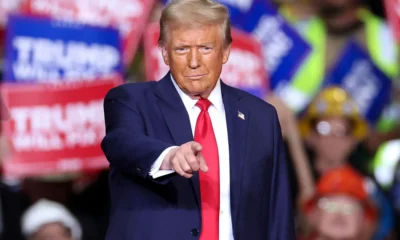

Trump describes US as an occupied country in dark closing message focused on immigration
-


Harris grilled on Fox News on immigration, Biden’s fitness for office
-
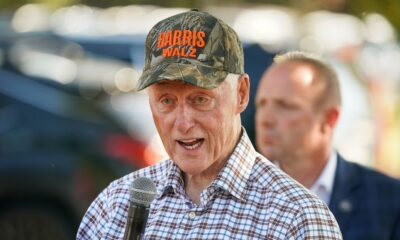

Trump campaign tries to push immigration issue over Bill Clinton’s comments on Laken Riley
-


Trump is set to respond to Harris on immigration during his visit to a small Wisconsin town
-


Harris promises tougher immigration, fentanyl controls at border
-
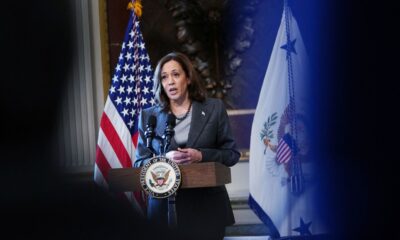

Why playing it safe on immigration and crime could be a big risk for Harris
AP
The final day of voting in the US is here, after tens of millions have already cast their ballots
Published
6 months agoon
November 5, 2024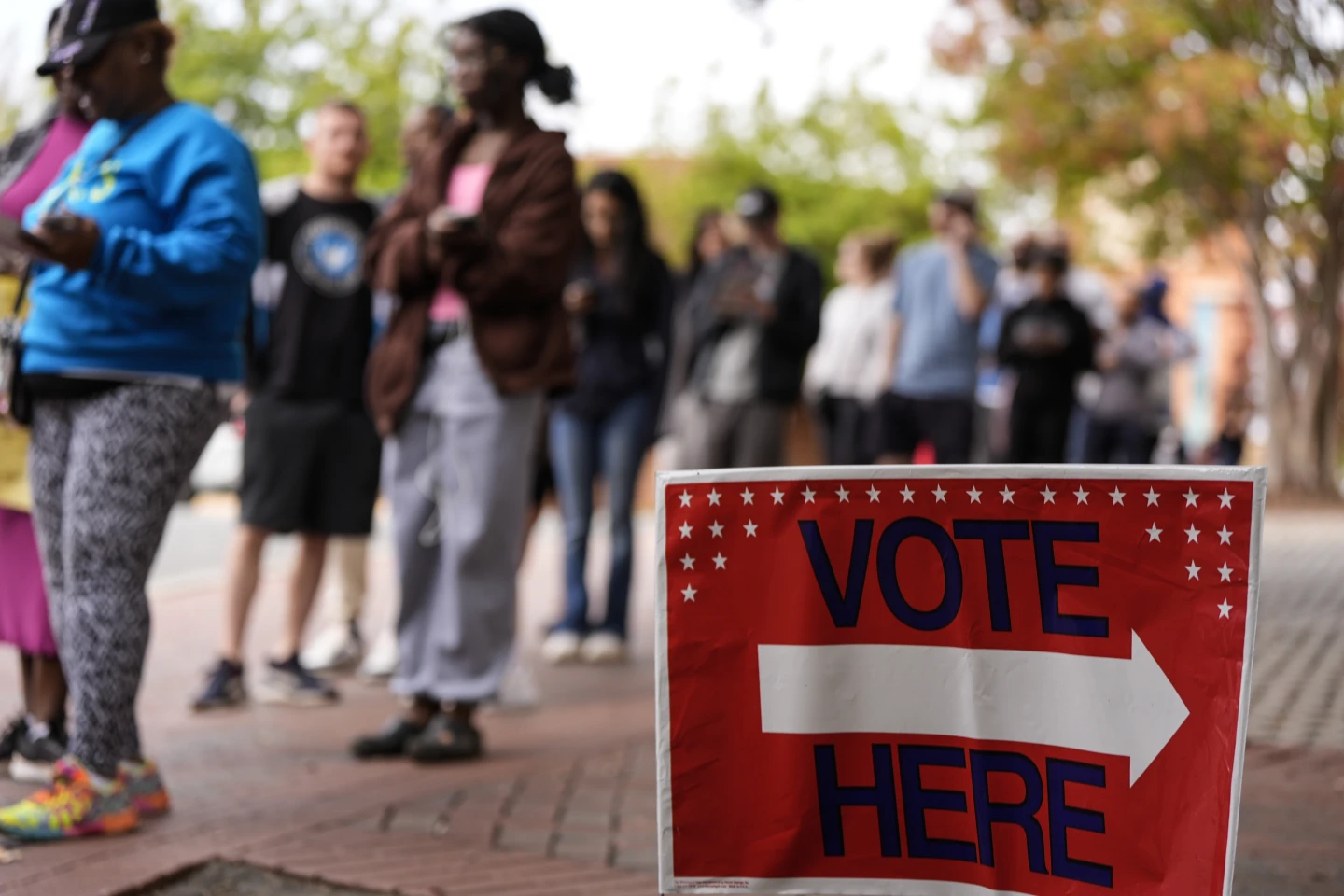
1 of 10 |
People stand in line during the last day of early voting, Saturday, Nov. 2, 2024, in Charlotte, N.C. (AP Photo/Mike Stewart)Read More
2 of 10 |
Voters line up to vote as a early voting location opened in Carmel, Ind., Wednesday, Oct. 23, 2024. (AP Photo/Michael Conroy)
3 of 10 |
A person walks past a sign during early voting in the general election, Friday, Nov. 1, 2024, in Fall River, Mass. (AP Photo/Steven Senne)
4 of 10 |
An election worker demonstrates mail-in ballot processing during a media preview at the Philadelphia Election Warehouse, in Philadelphia, Friday, Oct. 25, 2024. (AP Photo/Matt Rourke)
5 of 10 |
A voter fills out their their ballot during early voting in the general election, Friday, Nov. 1, 2024, in Fall River, Mass. (AP Photo/Steven Senne)
6 of 10 |
People line up to vote at the Chicago Early Voting Loop Supersite in Chicago, Thursday, Oct. 24, 2024. (AP Photo/Nam Y. Huh)
7 of 10 |
Bennett College student Zairen Jackson listens to a fellow student answer a question during a roundtable in Greensboro, N.C., Tuesday, Oct. 8, 2024. (AP Photo/Chuck Burton)
8 of 10 |
FILE – A Delaware County secured drop box for the return of vote-by-mail ballots is pictured, May 2, 2022, in Newtown Square, Pa. (AP Photo/Matt Rourke, File)
9 of 10 |
An elections official sorts counted mail-in ballots on the first day of tabulation, Wednesday, Oct. 23, 2024, at the Maricopa County Recorder’s Office in Phoenix. (AP Photo/Matt York)
10 of 10 |
People wait in line to cast their ballots at an early voting location, Thursday, Oct. 31, 2024, in Blue Springs, Mo. (AP Photo/Charlie Riedel)
BY CHRISTINA A. CASSIDY AND ALI SWENSONUpdated 11:05 AM GMT+6, November 5, 2024
WASHINGTON (AP) — Election Day 2024 arrived Tuesday — with tens of millions of Americans having already cast their ballots. Those include record numbers in Georgia, North Carolina and other battleground states that could decide the winner.
The early turnout in Georgia, which has flipped between the Republican and Democratic nominees in the previous two presidential elections, has been so robust — over 4 million voters — that a top official in the secretary of state’s office said the big day could look like a “ghost town” at the polls.
As of Monday, Associated Press tracking of advance voting nationwide showed roughly 82 million ballots already cast — slightly more than half the total number of votes in the presidential election four years earlier. That’s driven partly by Republican voters, who were casting early ballots at a higher rate than in recent previous elections after a campaign by former President Donald Trump and the Republican National Committee to counter the Democrats’ longstanding advantage in the early vote.
That included in the parts of western North Carolina hammered last month by Hurricane Helene. State and local election officials, benefiting from changes made by the Republican-controlled legislature, pulled off a herculean effort to ensure residents could cast their ballots as they dealt with power outages, lack of water and washed out roads.
By the time early voting in North Carolina had ended on Saturday, over 4.4 million voters — or nearly 57% of all registered voters in the state — had cast their ballots. As of Monday, turnout in the 25 western counties affected by the hurricane was even stronger at 59% of registered voters, state election board Executive Director Karen Brinson Bell said.
Brinson Bell called the voters and election workers in the hurricane-hit counties “an inspiration to us all.”
Besides the hurricanes in North Carolina and Florida, the most worrisome disruptions to the election season so far were arson attacks that damaged ballots in two drop boxes near the Oregon-Washington border. Authorities there were searching for the person responsible.
The absence of any significant, widespread problems has not stopped Trump, the Republican nominee, or the RNC, which is now under his sway, from making numerous claims of fraud or election interference during the early voting period, a possible prelude to challenges after Election Day.
He has mischaracterized an investigation underway in Pennsylvania into roughly 2,500 potentially fraudulent voter registration applications by saying one of the counties was “caught with 2600 Fake Ballots and Forms, all written by the same person.” The investigation is into registration applications; there is no indication that ballots are involved.
In Georgia, Republicans sought to prohibit voters from returning mailed ballots to their local election office by the close of polls on Election Day, votes that are allowed under state law. A judge rejected their lawsuit over the weekend.
Trump and Republicans also have warned about the possibility that Democrats are recruiting masses of noncitizens to vote, a claim they have made without evidence and that runs counter to the data, including from Republican secretaries of state. Research has consistently shown that noncitizens registering to vote is rare. Any noncitizen who does faces the potential of felony charges and deportation, a significant disincentive.
One case of noncitizen voting was caught during early voting last month and resulted in felony charges in Michigan after a student from China cast an illegal early ballot.
This is the first presidential vote since Trump lost to Joe Biden four years ago and began various attempts to circumvent the outcome and remain in power. That climaxed with the violent Jan. 6, 2021, attack on the U.S. Capitol to halt certification of the results after Trump told his supporters to “fight like hell.”
Even now, a solid majority of Republicans believe Trump’s lie that Biden was not legitimately elected, despite reviews, audits and recounts in the battleground states that all affirmed Biden’s win. A survey last month from The Associated Press-NORC Center for Public Affairs Research showed Republicans remain much more skeptical than Democrats that their ballots will be counted accurately this year.
Seeking to rebuild voter confidence in a system targeted with false claims of widespread fraud, Republican lawmakers in more than a dozen states since 2020 have passed new voting restrictions. Those rules include shortening the window to apply or return a mail ballot, reducing the availability of ballot drop boxes and adding ID requirements.
On the last weekend before Election Day, Trump continued to falsely claim the election was being rigged against him and said a presidential winner should be declared on election night, before all the ballots are counted.
Vice President Kamala Harris urged voters not to fall for Trump’s tactic of casting doubt on elections. The Democratic nominee told supporters at a weekend rally in Michigan that the tactic was intended to suggest to people “that if they vote, their vote won’t matter.” Instead, she urged people who had already cast ballots to encourage their friends to do the same.
Through four years of election lies and voting-related conspiracy theories, local election officials have faced harassment and even death threats. That has prompted high turnover and led to heightened security for election offices and polling sites that includes panic buttons and bullet-proof glass.
While there have been no major reports of any malicious cyberactivity affecting election offices, foreign actors have been active in using fake social media profiles and websites to drum up partisan vitriol and disinformation. In the final weeks, U.S. intelligence officials have attributed to Russia multiple fake videos alleging election fraud in presidential swing states.
On the eve of Election Day, they issued a joint statement with federal law enforcement agencies warning that Russia in particular was ramping up its influence operations, including in ways that could incite violence, and likely would continue those efforts well after the votes have been cast.
Jen Easterly, the nation’s top election security official, urged Americans to rely on state and local election officials for information about elections.
“This is especially important as we are in an election cycle with an unprecedented amount of disinformation, including disinformation being aggressively peddled and amplified by our foreign adversaries at a greater scale than ever before,” she said. “We cannot allow our foreign adversaries to have a vote in our democracy.”
___
The Associated Press receives support from several private foundations to enhance its explanatory coverage of elections and democracy. See more about AP’s democracy initiative here. The AP is solely responsible for all content.
Swenson reports on election-related misinformation, disinformation and extremism for The Associated Press.
AP
Georgia high court says absentee ballots must be returned by Election Day, even in county with delay
Published
6 months agoon
November 5, 2024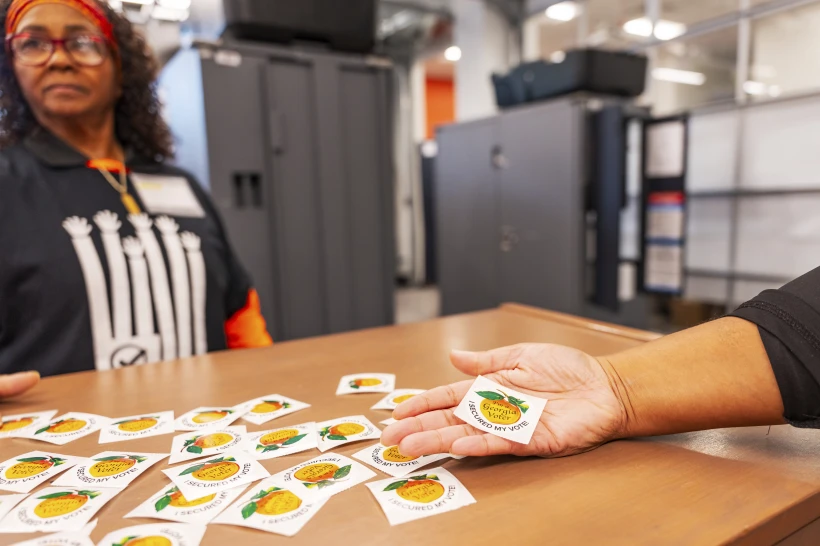
Updated 5:13 AM GMT+6, November 5, 2024
ATLANTA (AP) — Thousands of voters in Georgia’s third-largest county who received their absentee ballots late will not get an extension to return them, the state’s highest court decided on Monday.
Cobb County, just north of Atlanta, didn’t mail out absentee ballots to some 3,400 voters who had requested them until late last week. Georgia law says absentee ballots must be received by the close of polls on Election Day. But a judge in a lower court ruled last week that the ballots at issue could be counted if they’re received by this Friday, three days after Election Day, as long as they were postmarked by Tuesday.
The Georgia Supreme Court ruling means the affected Cobb County residents must vote in person on Election Day, which is Tuesday, or bring their absentee ballots to the county elections office by 7 p.m. that day.
The high court ruling instructs county election officials to notify the affected voters by email, text message and in a public message on the county election board’s website. And it orders officials to keep separate and sealed any ballots received after the Election Day deadline but before 5 p.m. Friday.
Board of elections Chair Tori Silas said the board will comply with the Supreme Court order, but it’s still up in the air whether ballots received after Election Day will be counted. The order only addressed a motion for a stay, so election officials will have to wait for the court’s final ruling to see whether votes received after Tuesday will be counted, she said in a statement.
To deliver the ballots on time, election officials in Cobb County were using U.S. Postal Service express mail and UPS overnight delivery, and sending the ballots with prepaid express return envelopes. The Board of Elections said that more than 1,000 of the absentee ballots being mailed late were being sent to people outside of Georgia.
Silas last week blamed the delay in sending out the ballots on faulty equipment and a late surge in absentee ballot requests during the week before the Oct. 25 deadline.
The original ruling extending the deadline stemmed from a lawsuit filed by the American Civil Liberties Union and the Southern Poverty Law Center on behalf of three Cobb County voters who said they had not received absentee ballots by mail as of Friday.
AP
Elon Musk’s $1 million-a-day voter sweepstakes can proceed, a Pennsylvania judge says
Published
6 months agoon
November 5, 2024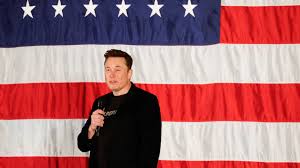
0 seconds of 1 minute, 46 secondsVolume 90%
1 of 7 |
Elon Musk is pledging to give away $1 million a day to voters for signing his political action committee’s petition backing the Constitution. The giveaway by the Donald Trump supporter is raising questions among some who say it’s a violation of the law.Read More
2 of 7 |
America PAC lawyer Chris Gober speaks with members of the media ahead of a hearing at a City Hall courtroom in Philadelphia, Monday, Nov. 4, 2024. (AP Photo/Matt Rourke)
3 of 7 |
Elon Musk speaks before Republican presidential nominee former President Donald Trump at a campaign rally at Madison Square Garden, Sunday, Oct. 27, 2024, in New York. (AP Photo/Alex Brandon)
4 of 7 |
Philadelphia District Attorney Larry Krasner arrives for a hearing at a City Hall courtroom, in Philadelphia, Monday, Nov. 4, 2024. (AP Photo/Matt Rourke)
5 of 7 |
America PAC lawyer Chris Gober speaks with members of the media ahead of a hearing at a City Hall courtroom in Philadelphia, Monday, Nov. 4, 2024. (AP Photo/Matt Rourke)
6 of 7 |
Elon Musk speaks before Republican presidential nominee former President Donald Trump at a campaign rally at Madison Square Garden, Sunday, Oct. 27, 2024, in New York. (AP Photo/Evan Vucci)
7 of 7 |
Philadelphia District Attorney Larry Krasner, third from right, arrives for a hearing at a City Hall courtroom, Thursday, Oct. 31, 2024, in Philadelphia. (AP Photo/Matt Rourke)
BY MARYCLAIRE DALEUpdated 4:19 AM GMT+6, November 5, 2024Share
Follow live: Updates from AP’s coverage of the presidential election.
PHILADELPHIA (AP) — The $1 million-a-day voter sweepstakes that Elon Musk ‘s political action committee is hosting in swing states can continue through Tuesday’s presidential election, a Pennsylvania judge ruled Monday.
Common Pleas Court Judge Angelo Foglietta — ruling after Musk’s lawyers said the winners are paid spokespeople and not chosen by chance — did not immediately explain his reasoning.
District Attorney Larry Krasner, a Democrat, had called the process a scam “designed to actually influence a national election” and asked that it be shut down.
Musk lawyer Chris Gober said the final two recipients before Tuesday’s presidential election will be in Arizona on Monday and Michigan on Tuesday.
“The $1 million recipients are not chosen by chance,” Gober said Monday. “We know exactly who will be announced as the $1 million recipient today and tomorrow.”
Chris Young, the director and treasurer of America PAC, testified that the recipients are vetted ahead of time, to “feel out their personality, (and) make sure they were someone whose values aligned” with the group.
Musk’s lawyers, defending the effort, called it “core political speech” given that participants sign a petition endorsing the U.S. Constitution. They also said Krasner’s bid to shut it down under Pennsylvania law was moot because there would be no more Pennsylvania winners before the program ends Tuesday.
Young also acknowledged that the PAC made the recipients sign nondisclosure agreements.
“They couldn’t really reveal the truth about how they got the money, right?” Summers asked.
“Sounds right,” Young said.
In an Oct. 20 social media post shown in court, Musk said anyone signing the petition had “a daily chance of winning $1M!”
Summers grilled him on Musk’s use of both the words “chance” and “randomly,” prompting Young to concede the latter was not “the word I would have selected.”
Young said the winners knew they would be called on stage but not specifically that they would win the money.
Musk did not attend the hearing. He has committed more than $70 million to the super PAC to help Trump and other Republicans win in November.
“This was all a political marketing masquerading as a lottery,” Krasner testified Monday. “That’s what it is. A grift.”
Lawyers for Musk and the PAC said they do not plan to extend the lottery beyond Tuesday. Krasner said the first three winners, starting on Oct. 19, came from Pennsylvania in the days leading up to the state’s Oct. 21 voter registration deadline.
Other winners came from the battleground states of Wisconsin, Nevada, Arizona, Georgia, North Carolina and Michigan. It’s not clear if anyone has yet received the money. The PAC pledged they would get it by Nov. 30, according to an exhibit shown in court.
More than 1 million people from the seven states have registered for the sweepstakes by signing a petition saying they support the right to free speech and to bear arms, the first two amendments to the U.S. Constitution. Krasner questioned how the PAC might use their data, which it will have on hand well past the election.
“They were scammed for their information,” Krasner said. “It has almost unlimited use.”
Krasner’s team called Musk “the heartbeat of America PAC,” and the person announcing the winners and presenting the checks.
“He was the one who presented the checks, albeit large cardboard checks. We don’t really know if there are any real checks,” Summers said.
Foglietta presided over the case at Philadelphia City Hall after Musk and the PAC lost an effort to move it to federal court.
Krasner has said he could still consider criminal charges, as he’s tasked with protecting both lotteries and the integrity of elections.
Pennsylvania remains a key battleground state with 19 electoral votes and both Trump and Democratic Vice President Kamala Harris have repeatedly visited the state, including stops planned Monday in the final hours of the campaign.
Krasner — who noted that he has long driven a Tesla — said he could also seek civil damages for the Pennsylvania registrants. Musk is the CEO and largest shareholder of Tesla. He also owns the social media platform X, where America PAC has published posts on the sweepstakes, and the rocket ship maker SpaceX.
Dale covers national legal issues for The Associated Press, often focusing on the federal judiciary, gender law, #MeToo and NFL player concussions. Her work unsealing Bill Cosby’s testimony in a decade-old deposition led to his arrest and sexual assault trials.

US election live: Latest polls show Harris, Trump tied on election eve

Elon Musk’s $1m US voter giveaway to continue, Pennsylvania judge rules

Trump or Harris? Gaza war drives many Arab and Muslim voters to Jill Stein

Joe Rogan endorses Trump on eve of the election

Trump describes US as an occupied country in dark closing message focused on immigration
Trending
-

 The Washington Post8 months ago
The Washington Post8 months agoAre you still registered to vote? How to make sure you’re up to date.
-
Debates8 months ago
Donald Trump Vs Kamala Harris LIVE | The Big 2024 Debate | U.S. Election Latest
-

 CNN8 months ago
CNN8 months agoNew York Democrats are desperate to avoid repeat of their 2022 midterm collapse
-
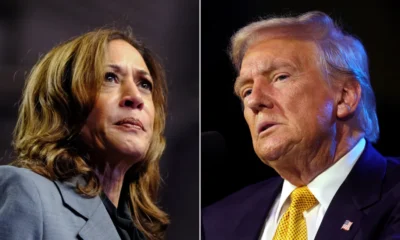
 CNN7 months ago
CNN7 months agoCNN Poll: Harris and Trump are tied in North Carolina, while vice president leads in Nebraska’s 2nd District
-

 Kamala Harris8 months ago
Kamala Harris8 months agoExclusive: Harris to release new economic proposals this week on US wealth creation
-
Debates8 months ago
US election: Blistering exchanges and fact checking in Kamala Harris and Donald Trump debate
-

 CNN8 months ago
CNN8 months agoHarris’ cash edge funds advertising blitz as Elon Musk cuts big check to House Republicans, new filings show
-

 CNN6 months ago
CNN6 months agoTrump describes US as an occupied country in dark closing message focused on immigration
